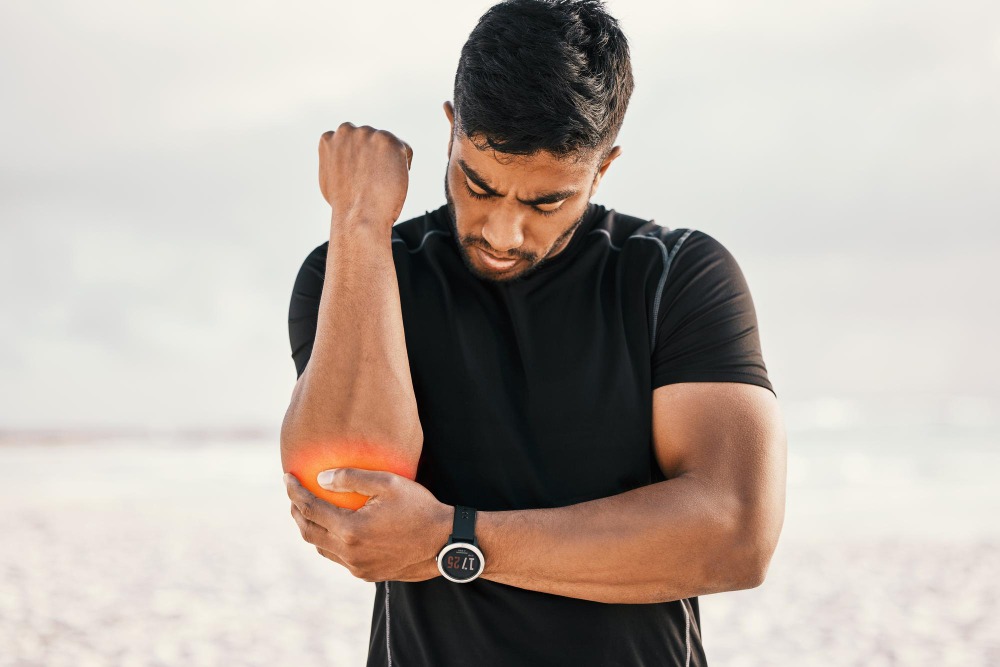The atmosphere around us can feel much heavier than usual, and that is due to increased air pressure. The high humidity associated with the monsoon, along with these pressure changes can cause some issues with our joints- and worsen already present inflammation-related symptoms. It hence makes more sense to keep moving, but in a more controlled manner, and to ensure that our quality of life doesn’t get any worse than normal.
Preventing Joint Pain This Monsoon
Let us look at the different ways to prevent joint pain this monsoon-
● Balanced diet: Digestion also gets affected now, so it makes sense to eat light, nutritious, and freshly prepared food. This will ensure that all nutrients are absorbed as needed, and they are used to repair and heal your body as a whole. So, it is time to incorporate fresh fruits and vegetables, whole grains, and any antioxidant-rich foods into your routine right away. This also includes adequate hydration.
● Working out in the right way: Never forget to warm up by stretching, before you begin your exercises for the day. This way, you will not unknowingly pull a muscle or get a cramp.
● Exercise: Your routine needs to be hard enough for your heart rate to increase, but gentle enough to help you move freely and not cause any undue restriction.
A hot shower will help relax your joints and body as a whole.
A hot shower will help relax your joints and body as a whole.
● Make some time to schedule a relaxing pain relief massage with aromatic oils to relieve stress. You could also use specific pain relief ingredients containing oils for better results.
● Joint stress is greatly exacerbated with the wrong type of footwear. So, invest in some good quality shoes or slippers, so that your soles remain cushioned and protected.
● Ensure that your living quarters are well-lit and ventilated, so there is less chance of a mold infestation. Dehumidifiers are your best friends concerning managing joint pain this season.
Joint Pain Treatment Approaches For This Monsoon
● Hot baths or warm compresses help improve blood circulation.
● Cold compresses can help relieve pain.
● Wear warm clothing, as joint pains can worsen if the temperatures drop.
● Eating the right types of food can also mean that you can effectively manage your body weight, reducing any excessive strain you may place on your joints otherwise.
● Supplementing diet as needed, after consulting your doctor is another great option to stay on top of your vitamin and mineral requirements this season.
● You can use anti-inflammatory medication to manage pain.
● Get your bloodwork done, if you suspect that something is amiss and you have never suffered from any joint pain before. The pain may be a symptom of an infection too.
Conclusion
Joint pain is mostly chronic in nature, and since there is no cure, effective management can become challenging. The changes in humidity and air pressure impact all organ systems in the body, but the bones and joints are especially impacted adversely. Making slight changes to our daily routine, eating well, drinking sufficient amounts of water, and just moving around slowly will help improve our mood and reduce the severity of pain. Managing pain will require different strategies- not just physical ones, but taking care of mental health is also crucial. So, talk to your doctor about how you’d like to manage your condition and you could get some really helpful tips in the process.
FAQs
1) What are the common types of pains that get aggravated in the monsoon?
It is mostly arthritic pains like the back, wrist, knees, and shoulders that get inflamed and the range of motion gets limited.
2) What kinds of exercises are helpful?
Aerobic exercise routines like walking, swimming, and yoga can really help a lot.
3) How does diet influence pain?
A good diet can help offset any persistent pains due to the presence of antioxidants and anti-inflammatory substances. These can all promote cellular health and reduce the magnitude of symptoms. Since digestion is also impacted, eating certain groups of foodstuffs could cause more bloating and increase pain.
4) Is Vitamin D important to manage joint pain?
Yes, a deficiency is bad and could potentially worsen joint aches.
5) How important is sleep in this whole equation?
Good quality sleep is a necessity in the war against chronic pain. Sleeping soundly becomes a challenge, but lack of sleep can make you feel worse by influencing your mood negatively. Using the appropriate medication is one way to ensure that you can sleep, and recover enough to face the next day. Other techniques like meditation, yoga, reiki, or CBT can also be used.




